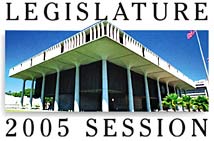Panel kills bill
to alter project’s
land classification
A bill to resolve the legal problems that halted the 1,550-acre Hokulia residential project in Kona has been killed in a state House committee.
|
|
Following extensive testimony against the bill on Saturday, there were not enough votes to pass the measure, said its sponsor, Rep. Bob Herkes of Kona.
"It was deferred into oblivion," he said.
Herkes said he will try to resurrect it, but that can be difficult.
In 2003 and 2004, Kona Circuit Judge Ronald Ibarra ruled that Hokulia, with $300 million invested so far, is an urban project being illegally built on agricultural land. Ibarra ordered Hokulia developer 1250 Oceanside Partners to seek a new classification from the state, generally understood to mean "urban" designation.
Instead, Herkes' bill would have approved a little-used alternative of "rural" designation.
In introductory language, Herkes' bill warned of damage to the state's construction industry by Ibarra's ruling.
"The counties, people in business, finance, development, and the community at large are concerned that such decisions cause tremendous damage and a debilitating uncertainty to the entire state," the bill says.
Alan Murakami, one of the attorneys opposed to Hokulia who persuaded Ibarra to halt the project, disputed that claim, pointing to the building boom going on in Kona.
"We know most displaced Hokulia workers got (new) jobs practically instantly. People are flooding to Kona from the other side of the island," he said.
"This is a rogue developer," he said, referring to a 1994 letter from Hokulia's own attorney warning that homes on agricultural land could run into trouble.
"Other developers who follow the law should not feel any uncertainty," Murakami said.
Herkes' overall plan called for Hokulia to donate $2.5 million for rural preservation in South Kona and Kau as a companion to approval for Hokulia.
Hokulia has an appeal of Ibarra's ruling pending in the state Supreme Court.
[News] [Business] [Features] [Sports] [Editorial] [Do It Electric!]
[Classified Ads] [Search] [Subscribe] [Info] [Letter to Editor]
[Feedback]

